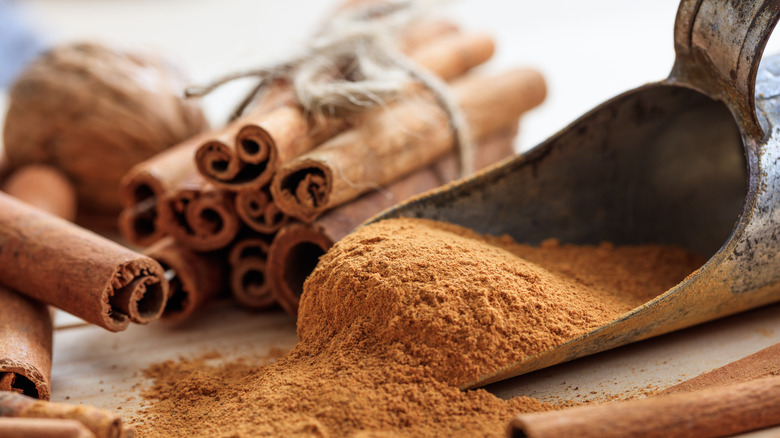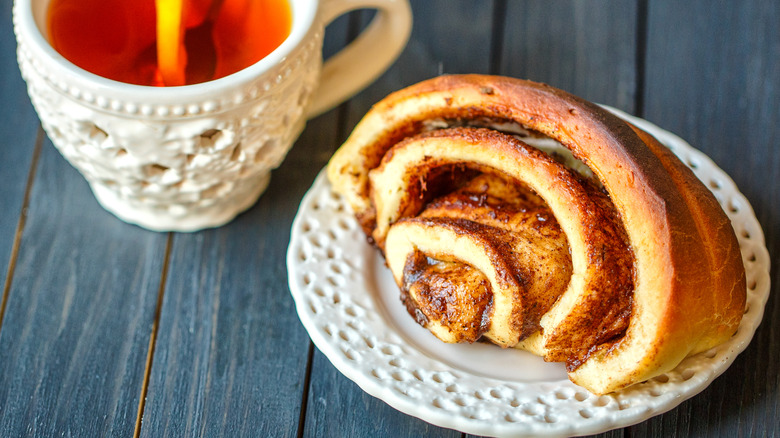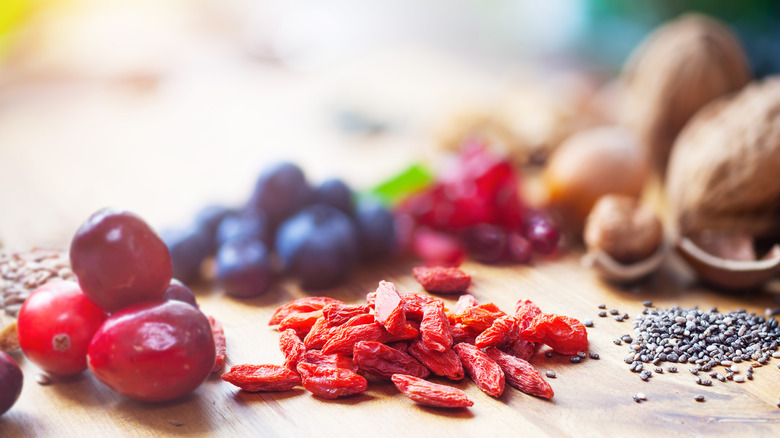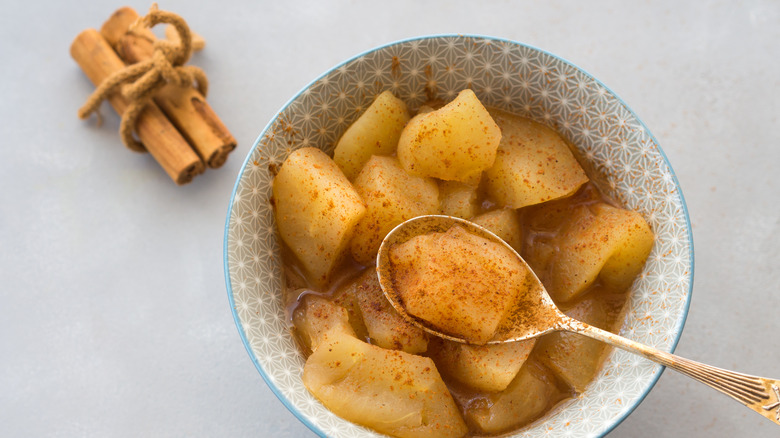The Unexpected Health Benefits Of Cinnamon
Do you have a favorite spice or herb? For as long as I can remember, mine has been cinnamon. I liked it in my oatmeal, on fruit, with sweet potatoes; you name it, and I'm sure I've tried it. Once, I even had an argument with a boyfriend over whether you could actually put too much cinnamon into a dish; he said yes, but as you can imagine, I gave a very blatant no. (Clearly, there's a reason that relationship didn't work out.)
All of that aside, it turns out my affinity for cinnamon is not only pleasing to my taste buds, it's supporting my healthy lifestyle. While I had heard several of these facts before, many of them were news to me, and I think you're going to be pleasantly surprised as well.
It's anti-bacterial, anti-fungal, and anti-viral
If you feel a cold or flu coming on, have you thought about reaching for the cinnamon? As it turns out, it may help! Dr. Nada Milosavljevic, MD, a board-certified and Harvard-trained physician, told me, "Cinnamon has been studied for it's ability to stop the growth of bacteria, as well as fungi." She went on to add that cinnamaldehyde, the main active component in cinnamon, "is thought to be the source of the infection-fighting capacity, and it's antibacterial effects have been used to fight Listeria and Salmonella."
Natural health and lifestyle expert, Jaya Jaya Myra, told me how the antiviral properties of cinnamon may even prevent viruses from entering the cells. "Basically, you can use cinnamon most any time you get sick," she said, "Even if you don't know whether you have a cold or bacterial infection. It'll still help!"
It helps reduce inflammation
If you have found yourself fighting arthritis pain, headaches, or other swelling and inflammation in the body, it may be time to reach for the cinnamon! "One of the essential components of cinnamon, cinnamyl alcohol, which contributes to the release of histamine, has been shown in several lab studies to exert an anti-inflammatory effect," said Dr. Milosavljevic.
She went on to add that cinnamon stimulates circulation, which will help relieve muscle pain, and since it is a hot herb, it can be particularly beneficial for aches and pains that are worsened with cold weather.
It may help during that time of the month
Without giving away more information than you actually may want to know about me, I have suffered from severe periods for as long as I can remember. I always thought this was normal and something that all of us ladies faced each month, until I learned that while my friends didn't necessarily enjoy that time of the month, most of them weren't in nearly as much pain or discomfort as I was.
For many years I would pop ibuprofen or whatever over-the-counter pain medication I could get my hands on, but it turns out that the cinnamon hiding in my kitchen cabinet could be the next best thing. "It may reduce heavy bleeding during menses commonly associated with increased pain and cramping," said Myra. After learning about the anti-inflammatory benefits of cinnamon, this suddenly seemed so obvious!
It can boost brain activity
As someone with a history of Alzheimer's and Parkinson's disease in the family, I am constantly on the hunt for any and every natural remedy and practice that may help keep my brain working at its peak, for as long as possible. And guess what. Cinnamon may help defend against such neurological disorders.
"One way that cinnamon protects cognitive function and brain health is because it activates neuro-protective proteins that protect brain cells from mutation and undergoing damage," said functional practitioner, Dr. Josh Axe. "This further reduces the negative effects of oxidative stress by stopping cells from morphing and self-destructing." That sounds like enough of a reason to start sprinkling cinnamon on everything!
It may help reduce blood sugar
While we often think of cinnamon being incorporated into sweet treats like apple pie, cinnamon rolls, cider, and muffins, cinnamon itself isn't sweet. Therefore, cinnamon can be used to help stabilize and reduce blood-sugar levels, and improve sensitivity to insulin.
Because of this, cinnamon can be particularly beneficial to those with diabetes. Dr. Axe explains, "These benefits of cinnamon exist because it plays a part in blocking certain enzymes called alanines which allows for glucose to be absorbed into the blood." Basically, if you just ate a high-sugar meal, the cinnamon is going to help reduce the amount of sugar entering your bloodstream.
It supports good dental hygiene
While most of us think of peppermint when it comes to our oral hygiene, it appears we should also be reaching for the cinnamon-based products, as well! In fact, in a study comparing cinnamon oil and clove oil for use in the treatment of dental concerns, cinnamon proved to be more beneficial. "Because it removes oral bacteria," said Dr. Axe, "Cinnamon has the ability to naturally remove bad breath without adding any chemicals to the body."
It's packed with antioxidants
We all know that we should be packing our diets with antioxidant rich foods to help protect the body from free radicals and other harmful molecules. Commonly known antioxidant-rich foods include goji berries, blueberries, and dark chocolate, but also on that list are herbs, including cinnamon. In fact, a study of 26 different spices showed that cinnamon had the highest antioxidant activity.
While this means cinnamon can be used as an antioxidant in food, to me this means it's time to make a trail mix with dark chocolate, goji berries, pecans and cinnamon for a delicious and super nutritious snack!
Not all cinnamon is created equal
One thing that I found particularly interesting is that not all cinnamon is created equal. For years, I never paid attention to what I was buying when it came to cinnamon. I always assumed it was all the same. Turns out, there are a handful of varieties, but the two main ones we see in our grocery stores are cassia and ceylon.
Ceylon is most notably referred to as "true cinnamon" and it is also the one recommended the most by doctors. According to Cinnamon Vogue, "Coumarin is a substance that can cause liver damage or complete failure. Only ceylon cinnamon has low levels of coumarin, while all other varieties of cinnamon have high levels of coumarin." While ceylon cinnamon may be a bit more expensive, it's definitely worth the added cost!
How to incorporate more cinnamon into your diet
If you are anything like me, it's really not that hard to add more cinnamon to your day. While you can always reach for a natural cinnamon based gum or toothpaste to take advantage of those oral benefits, I absolutely love to sprinkle it on nearly everything I eat.
You can try a baked sweet potato with a little almond butter and cinnamon, add some cinnamon to your morning post-workout protein smoothie, bake an apple with cinnamon for a healthy dessert, or use a little extra sprinkle on your oatmeal in the morning. Regardless of the ways you find to add a little more cinnamon to your diet, I think it's safe to say we should be using cinnamon just about every chance we get!









